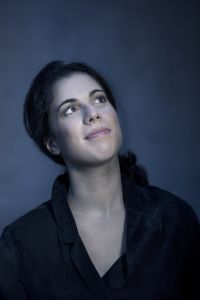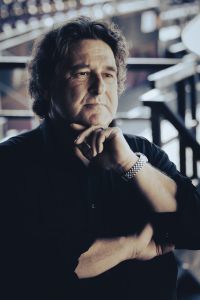It is as dictators at the rostrum that figures such as Teodor Currentzis, Arturo Toscanini, and Herbert von Karajan are frequently described, in contrast to the principle of democratic leadership exemplified by such figures as Bruno Walter, Marie Jacquot, and Johannes Wildner. But must a conductor indeed work differently these days, and have the demands being made of conductors changed?
Before the position of conductor became established, it was from the harpsicord or the first violin that central decisions on tempo, sound, and dynamics were made.
The conducting profession is still a young one compared with that of composing; after all, standing up front and beating time dates back only to Jean-Baptiste Lully, who lived just over three centuries ago. Lully led performances with a long staff—and at that time, such a staff was typically struck on the floor. It was precisely this original mode of conducting that caused Lully’s death. He is said to have inadvertently injured his foot with his heavy conducting staff, entailing health consequences to which he eventually succumbed. Carl Maria von Weber, in conducting his opera Der Freischütz, became a further pioneer of the conducting profession.1 And Richard Wagner,2 in his treatise on his own conducting, viewed tempo as the central quality of a Kapellmeister—for “this is the point at which it becomes evident whether a conductor understands his business or not.”3
The use of the baton and a baton’s length are matters of taste—as one can see in the case of Valery Gergiev, who considers even batons the length of a toothpick to be suitable. But the baton can also serve as a means of lending form to outbursts of rage, as Arturo Toscanini is said to have frequently illustrated.4
So why do we even need conductors, seeing as ensembles such as the Orpheus Chamber Orchestra and the West-Eastern Divan Orchestra quite successfully do without centralised leadership?5

According to the conductor and mdw professor Johannes Wildner, the need for someone in a Kapellmeister-like role always exists. Wildner views a general principle of ordering or leadership as an essential golden thread that unites an orchestra’s multifarious voices. Conductor and mdw Alumna Marie Jacquot, for her part, views achieving
agreement on musical interpretation as being the maxim of the conductors’ trade. And dedicated work on the part of a conductor, says Jacquot, also significantly improves rehearsals’ effectiveness, enabling programmes to be readied quickly for performance—an efficiency boost that could only be topped by Hans Knappertsbusch: ”Kna” was known for doing without rehearsals entirely.
Elias Canetti characterised conductors as striking embodiments of power, power that is expressed as control over both the orchestra and the audience. In Canetti’s telling, the conductor wields sole power “of life and death over the voices of the instruments”.6 Marie Jacquot, however, views herself and her profession as being part of what is much rather a democratic and regulative tradition. She describes a clear trend in this profession’s development towards viewing an ensemble’s musicians as human beings rather than as a mere sound-producing body. For Johannes Wildner, the point is to “create a broad, informative offering” that aims to achieve a high degree of consensus between the conductor’s leadership and the musicians. Teodor Currentzis, on the other hand, might be viewed as a present-day counterweight to democratic approaches, as a master of sound who forms the expressive ideal within himself and attempts to model the result through the musicians—with rehearsals, their duration, and the passages to be repeated all conforming to his will and desires. He’s also known for employing unconventional techniques, such as the learning of baroque dances prior to rehearsing a work from that era. Arturo Toscanini and Herbert von Karajan are others who can be viewed as having been situated more towards autocratic decision-making from the front, says Johannes Wildner.
Both Marie Jacquot and Johannes Wildner come from the Viennese school of conducting founded by Hans Swarowsky. This tradition emphasises historico-teleological interpretation and rigorous study of a given work’s score and its history. Appearing and performing before an audience, says Wildner, represents perhaps just 3 % of a conductor’s activities and obligations. He describes the profession’s routine as follows: “You go to an orchestra or a theatre, rehearse, rehearse again, dress rehearse, and perform—and then you do repeat performances.”
Conductor Marie Jacquot describes her everyday life as variety-packed, exciting, and eventful, but she does hasten to add that not everything is quite so rosy. Because apart from the fact that this is hard work, her profession also makes it tough to achieve a normal “work-life balance” and demands a lot of flexibility.
Conductors are also among those professionals who haven’t been spared by digitisation. Marie Jacquot navigates the multimedia landscape with assurance: she produces her own podcast and is a welcome guest in numerous acoustic and audio-visual formats. Jacquot is also convinced that one’s online presence, where music needn’t always be the main focus, is more important than ever. Johannes Wildner adds that technology has now gained a presence in teaching and playing. The increasing ease with which one can now compare how colleagues conduct has opened up
lots of ways to inform oneself, while digital transformation in the orchestral realm manifests itself in the form of Bluetooth-capable footpedals and the replacement of paper scores by tablets. He points out, however, that performers are always subject to the risks posed by technical breakdowns and do enter into a certain

dependency when they use such technologies.
According to Jacquot, dealing critically with racism in historical works, LGBTQ-related topics, and the selection of which composers’ music to play also figures into the demands made on today’s conductors. And in any case, she says, this profession requires that the “masters on the podium” actively deal with, problematise, and provide information. Recent manifestations of this include public calls for conductors to take a stand in connection with Russia’s invasion of Ukraine.7 Conductors were indeed already political in the past, but it may just be that society is now more critical in discussing their actions and no longer affords virtuosos comprehensive immunity.
- Gerhart von Westerman, Knaurs Konzertführer, Donauland, 1952, p. 478.
- Christian Thielemann, Mein Leben mit Wagner, C.H. Beck, 2012, p. 58.
- Richard Wagner, Über das Dirigieren, https://books.google.at/books?id=QkzfCAAAQBAJ, p. 535.
- Rudolf Augstein, “Ein Dirigent, ja, das bin ich”, Spiegel, 1977.
- Valeria Lucentini, “Der Dirigent ist tot”, Revue Musicale Suisse, 2017, p. 42.
- Elias Canetti, Masse und Macht, Fischer, 1994, p. 468.
- Axel Brüggemann, “Liebe Sparkasse, hilf Teodor Currentzis”, https://crescendo.de/klassikwoche10-2022-netrebko-gergiev-currentzis-1000298387

